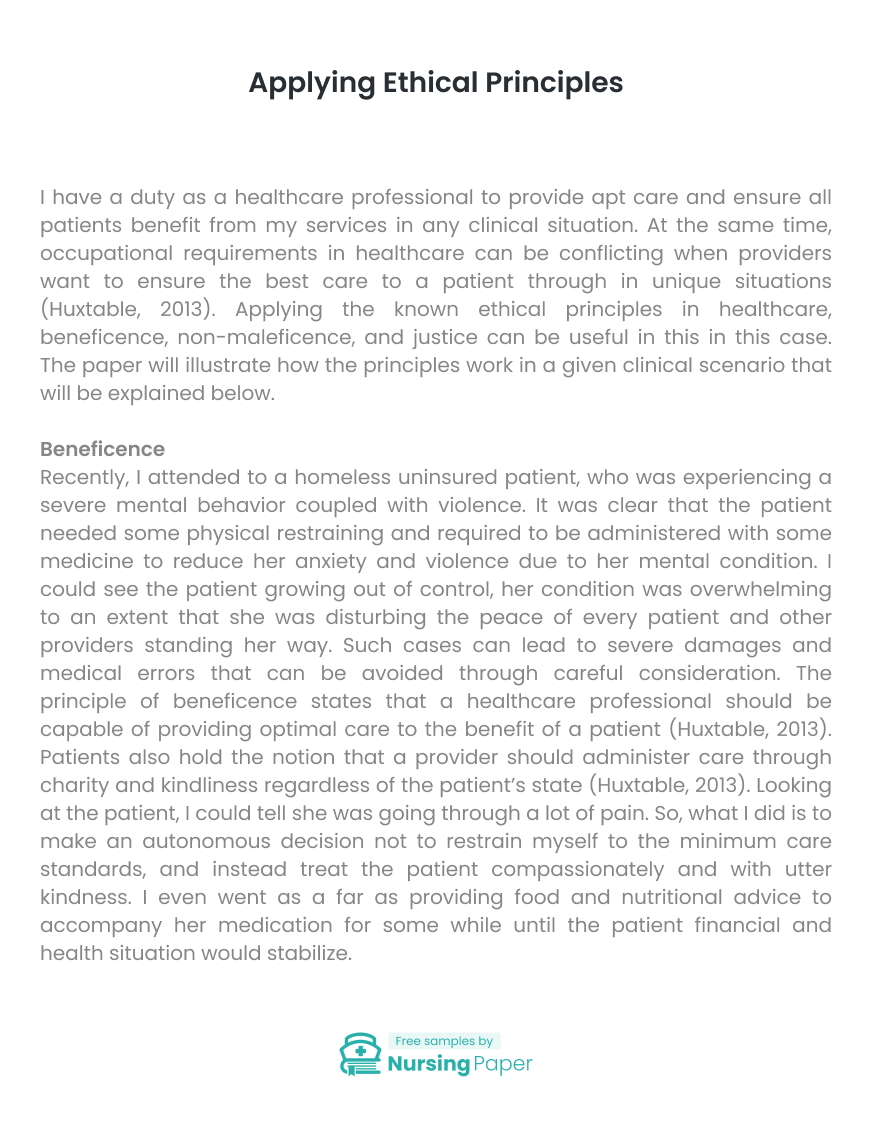
Applying Ethical Principles
I have a duty as a healthcare professional to provide apt care and ensure all patients benefit from my services in any clinical situation. At the same time, occupational requirements in healthcare can be conflicting when providers want to ensure the best care to a patient through in unique situations (Huxtable, 2013). Applying the known ethical principles in healthcare, beneficence, non-maleficence, and justice can be useful in this in this case. The paper will illustrate how the principles work in a given clinical scenario that will be explained below.
Beneficence
Recently, I attended to a homeless uninsured patient, who was experiencing a severe mental behavior coupled with violence. It was clear that the patient needed some physical restraining and required to be administered with some medicine to reduce her anxiety and violence due to her mental condition. I could see the patient growing out of control, her condition was overwhelming to an extent that she was disturbing the peace of every patient and other providers standing her way. Such cases can lead to severe damages and medical errors that can be avoided through careful consideration. The principle of beneficence states that a healthcare professional should be capable of providing optimal care to the benefit of a patient (Huxtable, 2013). Patients also hold the notion that a provider should administer care through charity and kindliness regardless of the patient’s state (Huxtable, 2013). Looking at the patient, I could tell she was going through a lot of pain. So, what I did is to make an autonomous decision not to restrain myself to the minimum care standards, and instead treat the patient compassionately and with utter kindness. I even went as a far as providing food and nutritional advice to accompany her medication for some while until the patient financial and health situation would stabilize. While giving priority to her care needs, we established a good rapport through better communication, and I explained to her why administering some medicine would be important and how we would restrain her physically to assist her control her mental behavior.


Non-maleficence
Another principle that would tag along with this situation is non-maleficence, which Abimbola, (2013) claims that physicians should only inflict harm and injury where necessary while providing care. The case of the uninsured homeless patient was different; she was uttering insulting words while punching other nurses haphazardly. Her violent behavior was devastating and would eventually lead to serious problems. I was forced to instruct security staff, and some nurses to restrain the patient even if it meant organized physical confrontation. The patient was agitated that she was being beaten to rest. After communicating with her, I assured her the operations were far from harassment, imposition, and discrimination. I helped the patient to understand that at times, harmful action can be the only necessary option although health professionals are discouraged to execute the option automatically and instead evaluate the situation and ensure that the benefits of the actions can outweigh negative consequences (Abimbola, 2013). Therefore, a physical confrontation was a necessary intervention to bring the patient’s situation to order (Abimbola, 2013).
Justice
Further, the principle of justice suggests that fairness and equality are fundamental elements to consider in allocating and utilizing healthcare resources (Huxtable, 2013). Looking at the patient, she was a poor homeless woman, who had no insurance coverage. I knew that collecting reimbursements from this patient would be a problem. Also, uninsured individuals would not be allowed to use hospital resources adequately. However, a morally accepted law suggests that people’s rights should be acknowledged appropriately including the right to health. We agreed with the patient to meet halfway, in that she would pay some significant out-of-pocket amount and I would administer some care and give her medicine to relieve her condition temporarily until she finds a suitable alternative (Abimbola, 2013). I continued to advise the patient on how to secure cheap Medicaid insurance as a minority person.
1. Abimbola, K. (2013). Culture and the principles of biomedical ethics. Journal of Commercial Biotechnology, 19(3), 31-39. doi: 10.5912/jcb.598.
2. Huxtable, R. (2013). For and against the four principles of biomedical ethics. Clinical Ethics, 8(2/3), 39-43. doi: 10.1177/1477750913486245.



The download will start shortly.

The download will start shortly.
 Subject:
Medicine
Subject:
Medicine  Number of pages: 3
Number of pages: 3  Subject:
Health and Social Care
Subject:
Health and Social Care  Number of pages: 13
Number of pages: 13  Subject:
Nursing
Subject:
Nursing  Number of pages: 3
Number of pages: 3  Subject:
Nursing
Subject:
Nursing  Number of pages: 17
Number of pages: 17  Subject:
Health and Social Care
Subject:
Health and Social Care  Number of pages: 2
Number of pages: 2  Subject:
Medicine
Subject:
Medicine  Number of pages: 2
Number of pages: 2  Subject:
Health and Social Care
Subject:
Health and Social Care  Number of pages: 3
Number of pages: 3  Subject:
Health and Social Care
Subject:
Health and Social Care  Number of pages: 2
Number of pages: 2  Subject:
Nursing
Subject:
Nursing  Number of pages: 6
Number of pages: 6  Subject:
Medicine
Subject:
Medicine  Number of pages: 6
Number of pages: 6  Subject:
Health and Social Care
Subject:
Health and Social Care  Number of pages: 3
Number of pages: 3  Subject:
Health and Social Care
Subject:
Health and Social Care  Number of pages: 2
Number of pages: 2  Subject:
Medicine
Subject:
Medicine  Number of pages: 8
Number of pages: 8  Subject:
Health and Social Care
Subject:
Health and Social Care  Number of pages: 9
Number of pages: 9  Subject:
Health and Social Care
Subject:
Health and Social Care  Number of pages: 5
Number of pages: 5 
